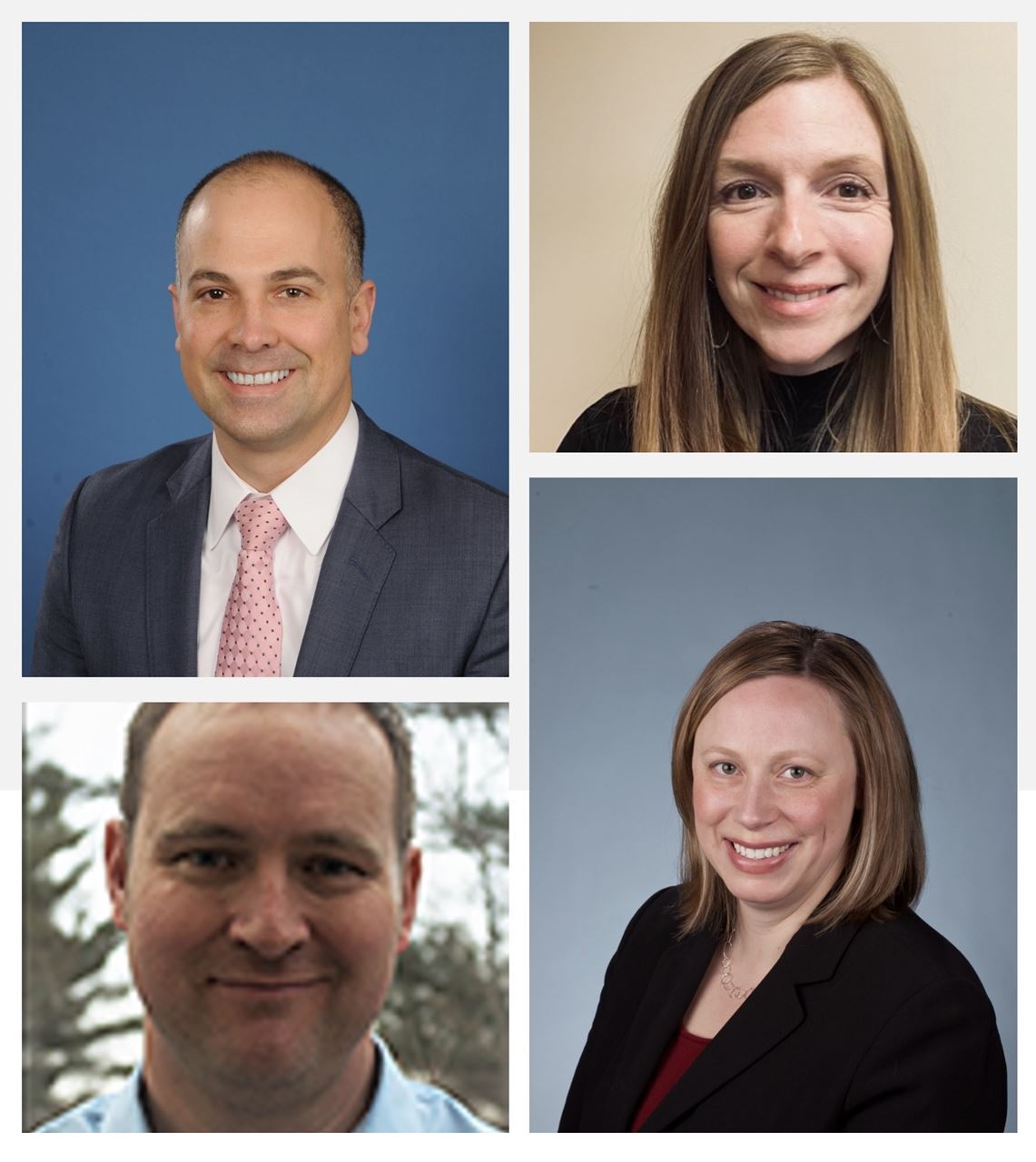Morning Session (3 CEUs)
Afternoon Session (3 CEUs)
Join MePA as a full member for a limited time discounted rate of 75% off you first year of membership, and then register for the conference at the $150 member rate. Use discount code MEPA2022CONF to get the special membership rate.
 Presenters (clockwise from top left):
Presenters (clockwise from top left):
Daniel Cheron, PhD, ABPP, VP of Programs, Implementation, and Training; Chief Psychologist at The Baker Center
Rachel Burrows, PhD, Child Psychologist, MaineGeneral Edmund N. Ervin Pediatrics Center
Rebecca Hoffmann Frances, MA, LMFT, Senior Director of Clinical Innovation and Training at Maine Behavioral Healthcare/ Assistant Clinical Professor of Psychiatry at Tufts University School of Medicine
Liam Shaw, MBA, LCSW, Manager of Outpatient Pediatric Behavioral Health MaineGeneral Edmund N. Ervin Pediatrics Center
CONFERENCE SCHEDULE
Opening Remarks: Jamie Pratt, PsyD, BCBA-D, Maine Psychological Association President. Dr. Pratt is Department Chair and Associate Professor of Educational and School Psychology at the University of Southern Maine
Morning Session (3 CEUs)
I. Facing the Future: Helping Youth and Families Overcome Anxiety During and Beyond the Pandemic – The need for effective and accessible mental health services for youth and families is greater than ever. The physical and emotional toll of the pandemic has nearly doubled the mental health needs of many children and teenagers. Yet, the true toll of the pandemic may not be known for some time. Psychologists have an important role in helping youth and families face this uncertain future with confidence. (3 hours)
Learning Objectives: Upon completion of the workshop, participants will be able to:
- Identify at least two current stressors nationally facing youth that may result in increased emotional or behavioral health problems
- Describe the short- and long-term impacts traumatic stress may have on youth mental health
- Summarize the cognitive-behavioral model used to treat youth anxiety disorders
- Explain how to use at least three techniques for the treatment of youth anxiety disorders
Dan Cheron, PhD, ABPP, VP of Programs, Implementation, and Training; Chief Psychologist at The Baker Center (Link to Presenter Bios)
Afternoon Session (3 CEUs)
II. Child and adolescent treatment services in Maine: statewide lens of evidence-based modalities and trainings available in Maine. (1 hour)
Learning Objectives:
- Learn the child and adolescent evidence-based treatments available in Maine
- Understand what and where these trainings are offered to clinicians
- Understand where treatments are available to children and adolescents
Liam Shaw, MBA, LCSW, Manager of Outpatient Pediatric Behavioral Health MaineGeneral Edmund N. Ervin Pediatrics Center (Link to Presenter Bios)
III. Assessing Youth Who Have Experienced Trauma: Evaluation of youth (from infancy to late adolescence) who have experienced trauma. Dr. Burrows will describe the Pediatric Rapid Evaluation Program which provides comprehensive assessments of children entering temporary state protective custody. (1 hour)
Learning Objectives:
- Understand the special assessment considerations for youth who have experienced trauma.
- Understand the benefits of interdisciplinary work/collaboration for this special population.
- Overview of assessment and screening tools available/appropriate for youth ranging in age from infancy to adolescence.
Rachel Burrows, PhD, Child Psychologist, MaineGeneral Edmund N. Ervin Pediatrics Center (Link to Presenter Bios)
IV. TF-CBT Treatment Approaches: Comprehensive overview of Trauma-focused CBT training, where it’s available, and concrete case examples. (1 hour)
Learning Objectives:
- Participants will learn the overview and rationale for trauma-focused cognitive behavioral therapy (TF-CBT), including information about research that supports the use of model with various populations
- Participants will be provided with detailed information about the components of TF-CBT, reasoning behind particular components, appropriate candidates for the model, as well as contraindications
- Participants will be provided with information about where they can learn more about TF-CBT and become certified in the model
Rebecca Hoffmann-Frances, MA, LMFT, Senior Director of Clinical Innovation and Training at Maine Behavioral Healthcare/ Assistant Clinical Professor of Psychiatry at Tufts University School of Medicine